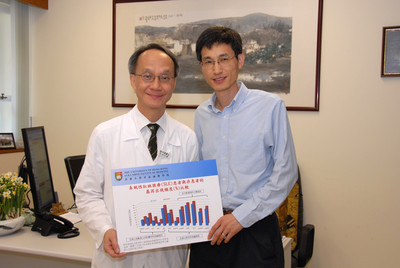HKU finds new genetic factors affecting systemic lupus erythematosus (SLE) in Asians
19 Mar 2013
The Human Genetics Laboratory of the Department of Paediatrics and Adolescent Medicine, The University of Hong Kong Li Ka Shing Faculty of Medicine, in collaboration with scientists in the Mainland China and Thailand, discovers genetic variations in five genes frequently found among systemic lupus erythematosus (SLE) patients of Asian populations to be associated with disease risk. This study finds these genes directly affecting onset of SLE and thus brings a new direction and breakthrough in the treatment and pharmacological development. Their work was published lately in prestigious genetic journal American Journal of Human Genetics.
The key researcher of this study, Professor Lau Yu-lung, Doris Zimmern Professor in Community Child Health, Chair Professor of the Department of Paediatrics and Adolescent Medicine says,“Genetic factors play an important role in SLE. Scientists have found that due to genetic factors, Asians are at higher risks of SLE compared with Europeans. The mechanism and specific genes are still the areas need to unravel. The study this time identifies more genetic factors and provides a real possibility that we could predict disease severity and clinical features based on patient’s genome in the future, and to choose treatment strategies accordingly.”
Research method and findings
To find out the genes associated with SLE, the researchers first genotyped more than 600 SLE cases from Hong Kong on more than half a million single nucleotide polymorphisms (SNP), a major type of genetic variation among different individuals in human genome. Then they examined their findings in more than 5000 cases and matched controls from other places, and confirmed that 5 distinct genomic positions (ARID5B、CD80、TET3、CDKN1B and DRAM1) are associated with SLE susceptibility. The study concludes that the frequency of these 5 distinct genes is higher in SLE cases of Hong Kong than other places. It therefore explains why there are higher risks of SLE among Asians than Europeans.
Another key researcher, Dr Yang Wanling, Assistant Professor of the Department of Paediatrics and Adolescent Medicine says,“It is clear that there are apparent population differences in susceptibility genes and we cannot rely on findings from European populations. We have to focus on genetic studies on the local population in order to fulfill the promises of personalized medicine and thus we have conducted this study.”
Background of research
During the years studying SLE genetics, the research team has identified nearly 10 genomic regions in Asian populations to be associated with SLE. They believe some of them are very likely to be Asian-specific. For example, a study from the same HKU team published in 2009 found a gene to be associated with SLE cases which also have kidney dysfunction but has little effect on those without. Together with the finding this time, it is believed that scientists will be able to treat patients according to his or her personal genome some days in the future.
Researchers on this study, however, point out that SLE is rather different from diseases that are caused by mutations from a single gene, it has a very complex disease etiology. Hundreds of genes may be involved in this disease. Finding them, and making use of the findings to guide risk prediction and personalized treatment will need much more work.
About Systemic Lupus Erythematosus (SLE)
SLE is a severe, prototype autoimmune disorder, mainly affecting women of child-bearing age. For every male affected, there are 9-10 female patients. It is also a chronic disease without a complete cure. Risk factors affecting SLE include both genetic factors and environment. SLE is a heterogeneous disease with apparent differences in severity, clinical manifestations and outcome, posing difficulties to treatment. Study of the genetic factors affecting SLE may help develop new, personalized therapeutic approaches towards this disease.
About the research team
The research on the genetic factors affecting SLE is conducted by HKU Li Ka Shing Faculty of Medicine and is led by Professor Lau Yu-lung and Dr Yang Wanling of the Department of Paediatrics and Adolescent Medicine. The study was started more than a decade ago. It received support from Professor Wallace Lau Chak-sing and Professor Daniel Chan Tak-mao of the Department of Medicine and nearly 20 other doctors in five hospitals in Hong Kong. It is also an effort of a huge collaborative consortium involving scientists in Anhui and Shanghai, Mainland China and scientists in Bangkok, Thailand. Their effort was also supported by Professor Sham Pak-chung, director of Centre for Genomic Sciences in HKU Li Ka Shing Faculty of Medicine.
To use the press release photo(s) for any publishing, publicity and related purpose, photo courtesy should be given to “Li Ka Shing Faculty of Medicine, The University of Hong Kong”

(Left) Professor Lau Yu-lung and (Right) Dr Yang Wanling from the Human Genetics Laboratory of the Department of Paediatrics and Adolescent Medicine, The University of Hong Kong Li Ka Shing Faculty of Medicine hope the scientists could predict disease severity and clinical features based on systemic lupus erythematosus patient’ genome in the future, and to choose treatment strategies accordingly.

The Human Genetics Laboratory of the Department of Paediatrics and Adolescent Medicine, The University of Hong Kong Li Ka Shing Faculty of Medicine, in collaboration with scientists in the Mainland and Thailand, discovers five genes associated with disease risk of systemic lupus erythematosus (SLE).
